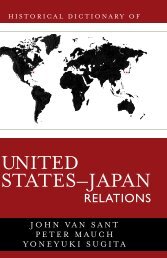Confucian Political Theory in the Face of the Future1 Mon-Han Tsai
Confucian Political Theory in the Face of the Future1 Mon-Han Tsai
Confucian Political Theory in the Face of the Future1 Mon-Han Tsai
You also want an ePaper? Increase the reach of your titles
YUMPU automatically turns print PDFs into web optimized ePapers that Google loves.
might have v<strong>in</strong>dicated his foresightedness to some extent, especially his criticism <strong>of</strong><br />
complacency about <strong>the</strong> world security, it rema<strong>in</strong>s less obvious if <strong>the</strong> new world disorder<br />
is be<strong>in</strong>g caused by <strong>the</strong> clash <strong>of</strong> civilisations let along <strong>the</strong> subversion <strong>of</strong> <strong>the</strong> supremacy <strong>of</strong><br />
Western political <strong>the</strong>ory as a normative pr<strong>in</strong>ciples <strong>of</strong>, and cognitive resources for<br />
understand<strong>in</strong>g political activities and <strong>in</strong>stitution around <strong>the</strong> globe. His discussion on<br />
each civilisation, say for <strong>in</strong>stance, S<strong>in</strong>ic and Japanese Civilisations is ra<strong>the</strong>r eccentric or<br />
<strong>in</strong>consistent by most accounts except on <strong>the</strong> current geopolitical configurations. Few<br />
would seriously argue for an <strong>in</strong>dependent Japanese civilisation separate from ‘S<strong>in</strong>ic’<br />
civilisation, not even Hunt<strong>in</strong>gdon’s former colleagues, Edw<strong>in</strong> Reischauer, John<br />
Fairbank and Albert Craig would acquiesce to it. They wrote a widely popular textbook<br />
on East Asia <strong>in</strong> which not only Japan was grouped toge<strong>the</strong>r with Ch<strong>in</strong>a and Korea, but<br />
also Vietnam. Moreover, <strong>in</strong> <strong>the</strong>ir narrative, Ch<strong>in</strong>a was <strong>the</strong> centre <strong>of</strong> this universe from<br />
which o<strong>the</strong>r East Asian countries derived from. While <strong>the</strong> generation after <strong>the</strong>m had<br />
tried to modify this S<strong>in</strong>o-centric view <strong>of</strong> East Asia somewhat, <strong>the</strong> most recent<br />
scholarships have returned to affirm <strong>the</strong> centrality <strong>of</strong> Ch<strong>in</strong>a <strong>in</strong> <strong>the</strong> formation and<br />
history <strong>of</strong> <strong>the</strong> East Asian world (Holcombe, 2001). Consequently, <strong>the</strong> demarcation that<br />
Hunt<strong>in</strong>gdon attempts to draw appears only to conform to <strong>the</strong> current geopolitical<br />
fault-l<strong>in</strong>es <strong>in</strong> East Asia. His discussion on what characterises a civilisation is even more<br />
problematic, because it merely reiterates many stereotypical descriptions <strong>of</strong> a<br />
civilisation <strong>in</strong> question and fails abjectly to provide any <strong>in</strong>-depth account <strong>of</strong> political<br />
th<strong>in</strong>k<strong>in</strong>g with<strong>in</strong> any particular civilisation. His <strong>the</strong>sis as a colourful travelogue <strong>of</strong> world<br />
politics does provide certa<strong>in</strong> <strong>in</strong>sights <strong>in</strong> <strong>the</strong> aftermath <strong>of</strong> <strong>the</strong> Cold War, but it is far from<br />
underm<strong>in</strong><strong>in</strong>g <strong>the</strong> normative reign <strong>of</strong> Western political <strong>the</strong>ory <strong>in</strong> <strong>the</strong> world.<br />
Fundamentally, he <strong>in</strong>advertently confuses <strong>the</strong> dom<strong>in</strong>ance <strong>of</strong> <strong>the</strong> might with <strong>the</strong><br />
normative prowess <strong>of</strong> <strong>the</strong> norms.<br />
In this paper, I will provide an account <strong>of</strong> <strong>the</strong> hegemony <strong>of</strong> Western political <strong>the</strong>ory<br />
<strong>in</strong> Ch<strong>in</strong>a s<strong>in</strong>ce <strong>the</strong> end <strong>of</strong> Q<strong>in</strong>g dynasty (1644-1911) by look<strong>in</strong>g <strong>in</strong>to how <strong>Confucian</strong>ism,<br />
previously <strong>the</strong> philosophical and moral foundation <strong>of</strong> Ch<strong>in</strong>ese politics (as well as Korean,<br />
Japanese and Vietnamese politics), has been react<strong>in</strong>g and adapt<strong>in</strong>g to it. The<br />
contemporary <strong>Confucian</strong> responses can be roughly divided <strong>in</strong>to two periods; <strong>the</strong> first,<br />
between 1920’s, immediately after <strong>the</strong> May Fourth movement <strong>in</strong> 1919 and <strong>the</strong> 1980’s,<br />
when <strong>the</strong> greatest New <strong>Confucian</strong> philosophers were dead or near <strong>the</strong> end <strong>of</strong> <strong>the</strong>ir lives.<br />
The second period began from <strong>the</strong> 1960’s <strong>in</strong> <strong>the</strong> US where mass exodus <strong>of</strong> Ch<strong>in</strong>ese<br />
<strong>in</strong>tellectuals had escaped to after <strong>the</strong> communist takeover <strong>of</strong> Ch<strong>in</strong>a <strong>in</strong> 1949, and<br />
cont<strong>in</strong>ues to this day. The first period can be succ<strong>in</strong>ctly described as <strong>the</strong> retreat <strong>of</strong><br />
2













